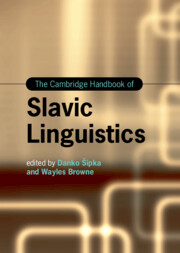
-
Select format
-
- Publisher:
- Cambridge University Press
- Publication date:
- May 2024
- May 2024
- ISBN:
- 9781108973021
- 9781108832670
- Dimensions:
- (244 x 170 mm)
- Weight & Pages:
- 1.54kg, 800 Pages
- Dimensions:
- Weight & Pages:
You may already have access via personal or institutional login
Book description
The linguistic study of the Slavic language family, with its rich syntactic and phonological structures, complex writing systems, and diverse socio-historical context, is a rapidly growing research area. Bringing together contributions from an international team of authors, this Handbook provides a systematic review of cutting-edge research in Slavic linguistics. It covers phonetics and phonology, morphology and syntax, lexicology, and sociolinguistics, and presents multiple theoretical perspectives, including synchronic and diachronic. Each chapter addresses a particular linguistic feature pertinent to Slavic languages, and covers the development of the feature from Proto-Slavic to present-day Slavic languages, the main findings in historical and ongoing research devoted to the feature, and a summary of the current state of the art in the field and what the directions of future research will be. Comprehensive yet accessible, it is essential reading for academic researchers and students in theoretical linguistics, linguistic typology, sociolinguistics and Slavic/East European Studies.
Reviews
‘This monumental volume brings together cutting-edge research in the field of Slavic linguistics by a collection of leading scholars, tracing both the historical foundations and providing state-of-the art theoretical contributions to the field. More than a handbook, it sets the stage for future directions in Slavic linguistics.’
Lenore A. Grenoble - The University of Chicago
‘This fine volume covers a wide range of topics pertaining to Slavic Linguistics, including several innovatively defined novel areas. It is an important contribution to the field, one that will withstand the test of time, to be sure.’
Brian D. Joseph - The Kenneth E. Naylor Professor of South Slavic Linguistics, the Ohio State University
‘A unique collection of contributions covering all the distinctive properties of the Slavic languages and representing the current state of the art in Slavic phonology, morphology, syntax, and the lexicon. This Handbook will be a key source for anyone researching Slavic languages, as well as an invaluable tool for university courses in Slavic linguistics.’
Iliyana Krapova - Associate Professor in Slavic Linguistics, University Ca' Foscari of Venice, Italy
Contents
Metrics
Full text views
Full text views help Loading metrics...
Loading metrics...
* Views captured on Cambridge Core between #date#. This data will be updated every 24 hours.
Usage data cannot currently be displayed.
Accessibility standard: Unknown
Why this information is here
This section outlines the accessibility features of this content - including support for screen readers, full keyboard navigation and high-contrast display options. This may not be relevant for you.
Accessibility Information
Accessibility compliance for the PDF of this book is currently unknown and may be updated in the future.


